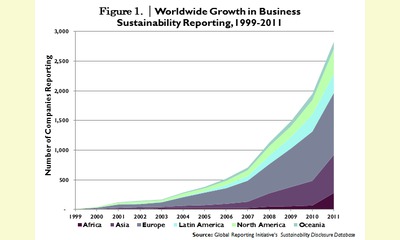|
|
More Businesses Pursue Triple Bottom Line for a Sustainable Economy
un articulo por Colleen Cordes, Worldwatch Institute (abridged)
As corporations of all sizes increasingly choose
to monitor and report on their social and
environmental impacts, a growing number of mostly
small and medium-sized companies are going even
further: They are volunteering to be held publicly
accountable to a new triple bottom line—
prioritizing people and the planet as well as
profits.

Source: Global Reporting Initiative's Sustainably Disclosure Database
click on photo to enlarge
Just how broadly, rapidly, and rigorously this
movement can spread is of critical importance,
given the supersized global impacts of for-profit
enterprises. Sustainable economies are likely to
remain elusive without substantial shifts in
corporate norms. As I point out in “More
Businesses Pursue Triple Bottom Line for a
Sustainable Economy,” the latest Vital
Signs Online study, recent data provide signs
that such change is possible and indeed may even
have begun.
Over the last 15 years, for example, the number of
businesses of all sizes that choose to self-assess
how sustainable their operations are, using widely
accepted social and environmental standards, and
to publicly disclose their results has been
growing rapidly, especially in Europe and Asia.
Recently there also has been a rise of a fast-
moving movement, with significant leadership
provided by sustainably minded businesses, whose
goal is to persuade lawmakers to create a new
legal status known as “benefit corporation” that
for-profit businesses can choose voluntarily. The
movement for benefit corporation statutes began in
the United States, under the leadership of B Lab,
which developed model legislation with the pro
bono help of U.S. law firms.
A “benefit corporation” is a corporate form that
requires a company to legally establish in its
original or amended articles of incorporation that
it has a general purpose of having a positive impact
on society and the environment . . .
Proponents of this new corporate form say it
essentially bakes a triple bottom line into a
company’s DNA that frees companies from the fear
of shareholder lawsuits if their decisions fail to
maximize shareholder value because of some
competing interest of other stakeholders, such as
workers. Under current corporate case law in the
United States, for example, corporate directors
are generally assumed to be liable in such suits.
Incorporation as a benefit corporation is intended
to establish the directors’ fiduciary
responsibility to consider the interests of all
stakeholders. Formalizing a company’s social and
environmental purposes under a legal framework
also makes it more likely that its good intentions
will survive the departure of its founders or any
major spurts of growth and that its directors will
have the legal backbone to fend off buyout offers
from conventional corporations that do not have
the same commitments.
Most benefit corporations to date are either small
or medium-sized businesses. But they include a few
larger companies that are privately held, such as
the outdoor apparel and accessory firm Patagonia
Inc., which reportedly had annual sales of about
$540 million for the year ending April 2012, and
King Arthur Flour, an employee-owned, 223-year-old
company with reported sales of about $84 million
in 2010. . .
|








|
DISCUSSION
Pregunta(s) relacionada(s) al artículo :
How can we get to a sustainable, peaceful economy?,
* * * * *
Comentario más reciente:
Annie Leonard: How to Be More than a Mindful Consumer
The way we make and use stuff is harming the world—and ourselves. To create a system that works, we can't just use our purchasing power. We must turn it into citizen power.
by Annie Leonard
posted Aug 22, 2013
Stuff activist Annie Leonard: “Consumerism, even when it tries to embrace ‘sustainable’ products, is a set of values that teaches us to define ourselves, communicate our identity, and seek meaning through accumulation of stuff, rather than through our values and activities and our community.” YES! photo by Lane Hartwell.
Since I released "The Story of Stuff" six years ago, the most frequent snarky remark I get from people trying to take me down a notch is about my own stuff: Don't you drive a car? What about your computer and your cellphone? What about your books? (To the last one, I answer that the book was printed on paper made from trash, not trees, but that doesn't stop them from smiling smugly at having exposed me as a materialistic hypocrite. Gotcha!)
Let me say it clearly: I'm neither for nor against stuff. I like stuff if it's well-made, honestly marketed, used for a long time, and at the end of its life recycled in a way that doesn't trash the planet, poison people, or exploit workers. Our stuff should not be artifacts of indulgence and disposability, like toys that are forgotten 15 minutes after the wrapping comes off, but things that are both practical and meaningful. British philosopher William Morris said it best: "Have nothing in your house that you do not know to be useful or believe to be beautiful."
Too many T-shirts
The life cycle of a simple cotton T-shirt—worldwide, 4 billion are made, sold, and discarded each year—knits together a chain of seemingly intractable problems, from the elusive definition of sustainable agriculture to the greed and classism of fashion marketing.
The story of a T-shirt not only gives us insight into the complexity of our relationship with even the simplest stuff; it also demonstrates why consumer activism—boycotting or avoiding products that don’t meet our personal standards for sustainability and fairness—will never be enough to bring about real and lasting change. Like a vast Venn diagram covering the entire planet, the environmental and social impacts of cheap T-shirts overlap and intersect on many layers, making it impossible to fix one without addressing the others.
I confess that my T-shirt drawer is so full it's hard to close. . ... continuación.

|
|









